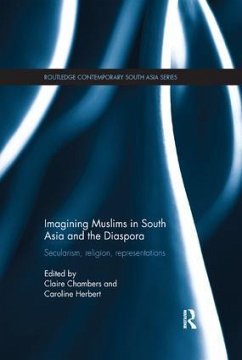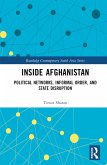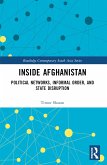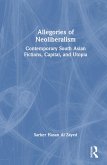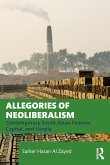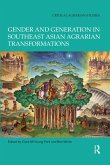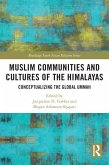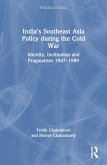Imagining Muslims in South Asia and the Diaspora
Secularism, Religion, Representations
Herausgeber: Herbert, Caroline; Chambers, Claire
Imagining Muslims in South Asia and the Diaspora
Secularism, Religion, Representations
Herausgeber: Herbert, Caroline; Chambers, Claire
- Broschiertes Buch
- Merkliste
- Auf die Merkliste
- Bewerten Bewerten
- Teilen
- Produkt teilen
- Produkterinnerung
- Produkterinnerung
Literary, cinematic and media representations of the disputed category of the â South Asian Muslimâ have undergone substantial change in the last few decades and in particular since the events of September 11, 2001.
Andere Kunden interessierten sich auch für
![Inside Afghanistan Inside Afghanistan]() Timor SharanInside Afghanistan196,99 €
Timor SharanInside Afghanistan196,99 €![Inside Afghanistan Inside Afghanistan]() Timor SharanInside Afghanistan28,99 €
Timor SharanInside Afghanistan28,99 €![Allegories of Neoliberalism Allegories of Neoliberalism]() Sarker Hasan Al ZayedAllegories of Neoliberalism152,99 €
Sarker Hasan Al ZayedAllegories of Neoliberalism152,99 €![Allegories of Neoliberalism Allegories of Neoliberalism]() Sarker Hasan Al ZayedAllegories of Neoliberalism42,99 €
Sarker Hasan Al ZayedAllegories of Neoliberalism42,99 €![Gender and Generation in Southeast Asian Agrarian Transformations Gender and Generation in Southeast Asian Agrarian Transformations]() Gender and Generation in Southeast Asian Agrarian Transformations62,99 €
Gender and Generation in Southeast Asian Agrarian Transformations62,99 €![Muslim Communities and Cultures of the Himalayas Muslim Communities and Cultures of the Himalayas]() Muslim Communities and Cultures of the Himalayas44,99 €
Muslim Communities and Cultures of the Himalayas44,99 €![India's Southeast Asia Policy during the Cold War India's Southeast Asia Policy during the Cold War]() Tridib ChakrabortiIndia's Southeast Asia Policy during the Cold War38,99 €
Tridib ChakrabortiIndia's Southeast Asia Policy during the Cold War38,99 €-
-
-
Literary, cinematic and media representations of the disputed category of the â South Asian Muslimâ have undergone substantial change in the last few decades and in particular since the events of September 11, 2001.
Hinweis: Dieser Artikel kann nur an eine deutsche Lieferadresse ausgeliefert werden.
Hinweis: Dieser Artikel kann nur an eine deutsche Lieferadresse ausgeliefert werden.
Produktdetails
- Produktdetails
- Routledge Contemporary South Asia Series
- Verlag: Taylor & Francis Inc
- Seitenzahl: 222
- Erscheinungstermin: 26. Oktober 2017
- Englisch
- Abmessung: 158mm x 234mm x 20mm
- Gewicht: 370g
- ISBN-13: 9780815377900
- ISBN-10: 0815377908
- Artikelnr.: 50149155
- Herstellerkennzeichnung
- Libri GmbH
- Europaallee 1
- 36244 Bad Hersfeld
- gpsr@libri.de
- Routledge Contemporary South Asia Series
- Verlag: Taylor & Francis Inc
- Seitenzahl: 222
- Erscheinungstermin: 26. Oktober 2017
- Englisch
- Abmessung: 158mm x 234mm x 20mm
- Gewicht: 370g
- ISBN-13: 9780815377900
- ISBN-10: 0815377908
- Artikelnr.: 50149155
- Herstellerkennzeichnung
- Libri GmbH
- Europaallee 1
- 36244 Bad Hersfeld
- gpsr@libri.de
Claire Chambers is Lecturer in Global Literature at the University of York, UK. She researches modern literature from South Asia, the Arab world and their diasporas. Claire is the author of British Muslim Fictions: Interviews with Contemporary Writers and the forthcoming Representations of Muslims in Britain. Caroline Herbert is Senior Lecturer in Postcolonial Literatures at Leeds Metropolitan University, UK. Her research centres on contemporary South Asian Literature and film, with a specific interest in narratives of urban modernity, secularism, and economic liberalization in India. She is editor of Postcolonial Cities: South Asia, a special issue of Moving Worlds (2013).
Introduction: Contexts and Text Part I: Surveying the Field; Comparative
Approaches 1. The Making of a Muslim 2. Representations of Young Muslims in
Contemporary British South Asian Fiction. 3. Before and Beyond the Nation:
South Asian and Maghrebi Muslim Women's Fiction Part II: Syncretism, Muslim
Cosmopolitanism, and Secularism 4. Restoring the Narration: South Asian
English writing and Al-Andalus 5. Music, Secularism and South Asian
Fiction: Muslim Culture and Minority Identities in Shashi Deshpande's
Small Remedies 6. 'A Shrine of Words': The Politics and Poetics of Space in
Agha Shahid Ali's The Country Without a Post Office 7. Hamlet in Paradise:
The Politics of Procrastination in Mirza Waheed's The Collaborator Part
III: Currents within South Asian Islam 8. Liberalizing Islam through the
Bildungsroman: Ed Husain's The Islamist 9. Enchanted Realms, Sceptical
Perspectives: Salman Rushdie's Recent Fiction 10. Tahmima Anam's The Good
Muslim: Bangladeshi Islam, Secularism and the Tablighi Jamaat Part IV:
Representations, Stereotypes, Islamophobia11. Saving Pakistan from Brown
Men: Benazir Bhutto as Pakistan's Last Best Hope for Democracy 12. Queer
South Asian Muslims: The Ethnic Closet and its Secular Limits 13. After
9/11: Islamophobia in Kamila Shamsie's Broken Verses and Burnt Shadows
Approaches 1. The Making of a Muslim 2. Representations of Young Muslims in
Contemporary British South Asian Fiction. 3. Before and Beyond the Nation:
South Asian and Maghrebi Muslim Women's Fiction Part II: Syncretism, Muslim
Cosmopolitanism, and Secularism 4. Restoring the Narration: South Asian
English writing and Al-Andalus 5. Music, Secularism and South Asian
Fiction: Muslim Culture and Minority Identities in Shashi Deshpande's
Small Remedies 6. 'A Shrine of Words': The Politics and Poetics of Space in
Agha Shahid Ali's The Country Without a Post Office 7. Hamlet in Paradise:
The Politics of Procrastination in Mirza Waheed's The Collaborator Part
III: Currents within South Asian Islam 8. Liberalizing Islam through the
Bildungsroman: Ed Husain's The Islamist 9. Enchanted Realms, Sceptical
Perspectives: Salman Rushdie's Recent Fiction 10. Tahmima Anam's The Good
Muslim: Bangladeshi Islam, Secularism and the Tablighi Jamaat Part IV:
Representations, Stereotypes, Islamophobia11. Saving Pakistan from Brown
Men: Benazir Bhutto as Pakistan's Last Best Hope for Democracy 12. Queer
South Asian Muslims: The Ethnic Closet and its Secular Limits 13. After
9/11: Islamophobia in Kamila Shamsie's Broken Verses and Burnt Shadows
Introduction: Contexts and Text Part I: Surveying the Field; Comparative
Approaches 1. The Making of a Muslim 2. Representations of Young Muslims in
Contemporary British South Asian Fiction. 3. Before and Beyond the Nation:
South Asian and Maghrebi Muslim Women's Fiction Part II: Syncretism, Muslim
Cosmopolitanism, and Secularism 4. Restoring the Narration: South Asian
English writing and Al-Andalus 5. Music, Secularism and South Asian
Fiction: Muslim Culture and Minority Identities in Shashi Deshpande's
Small Remedies 6. 'A Shrine of Words': The Politics and Poetics of Space in
Agha Shahid Ali's The Country Without a Post Office 7. Hamlet in Paradise:
The Politics of Procrastination in Mirza Waheed's The Collaborator Part
III: Currents within South Asian Islam 8. Liberalizing Islam through the
Bildungsroman: Ed Husain's The Islamist 9. Enchanted Realms, Sceptical
Perspectives: Salman Rushdie's Recent Fiction 10. Tahmima Anam's The Good
Muslim: Bangladeshi Islam, Secularism and the Tablighi Jamaat Part IV:
Representations, Stereotypes, Islamophobia11. Saving Pakistan from Brown
Men: Benazir Bhutto as Pakistan's Last Best Hope for Democracy 12. Queer
South Asian Muslims: The Ethnic Closet and its Secular Limits 13. After
9/11: Islamophobia in Kamila Shamsie's Broken Verses and Burnt Shadows
Approaches 1. The Making of a Muslim 2. Representations of Young Muslims in
Contemporary British South Asian Fiction. 3. Before and Beyond the Nation:
South Asian and Maghrebi Muslim Women's Fiction Part II: Syncretism, Muslim
Cosmopolitanism, and Secularism 4. Restoring the Narration: South Asian
English writing and Al-Andalus 5. Music, Secularism and South Asian
Fiction: Muslim Culture and Minority Identities in Shashi Deshpande's
Small Remedies 6. 'A Shrine of Words': The Politics and Poetics of Space in
Agha Shahid Ali's The Country Without a Post Office 7. Hamlet in Paradise:
The Politics of Procrastination in Mirza Waheed's The Collaborator Part
III: Currents within South Asian Islam 8. Liberalizing Islam through the
Bildungsroman: Ed Husain's The Islamist 9. Enchanted Realms, Sceptical
Perspectives: Salman Rushdie's Recent Fiction 10. Tahmima Anam's The Good
Muslim: Bangladeshi Islam, Secularism and the Tablighi Jamaat Part IV:
Representations, Stereotypes, Islamophobia11. Saving Pakistan from Brown
Men: Benazir Bhutto as Pakistan's Last Best Hope for Democracy 12. Queer
South Asian Muslims: The Ethnic Closet and its Secular Limits 13. After
9/11: Islamophobia in Kamila Shamsie's Broken Verses and Burnt Shadows

